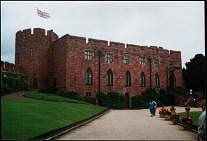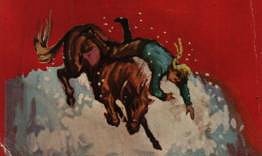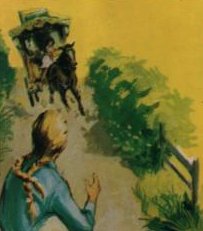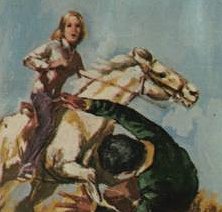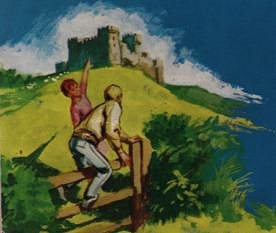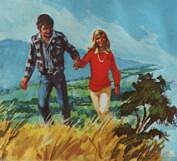| bc | Malcolm
Saville The Lone Pine books and all the main characters will be found here. John's Malcolm Saville site (updated external) "All roads are long that lead to one's heart's desire." (Joseph Conrad) There are several essential contradictions built into those stories which develop into what we might call "children's series" literature. One of these is the unlikely basic premise of so many different adventures happening to such a small set of well-known characters. After all there are just so many treasures to be found, just so many hidden passages to explore, just so many criminals to be outwitted and, not least, so many times for dangers to be risked or even injury to be inflicted. The most difficult problem of all, however, concerns the characters. The writer faces the question , "Should they stay the same or should they develop into something different and mature and change in the way that all children do ?" Different authors have opted for the different possibilities. Anne Shirley of "Green Gables" fame, most gloriously and movingly, becomes a woman, whilst the incorrigible "William" and "Jennings" remain wonderfully frozen forever in the ten to eleven age bracket. The Hardy boys, product of the Stratemeyer team of writers, under the pseudonym Franklin W. Dixon, eventually move on from Bayport High School but this was more a deliberate repackaging of a product that had grown stale than an organic growth from the stories themselves. It is difficult to read the first of the Hardy Boys Casenotes series, where Joe Hardy's long-time girlfriend, Iola Martin, is brusquely despatched by a bomb, without a shudder at the callousness of the editors who could allow it to happen. That really was making Joe grow up with a bang. And yet this seemingly insoluble problem of keeping our attachment to the characters strong whilst allowing them to mature, can be handled with both subtlety and charm. Sometimes, almost without us realising it, it can become the principal attraction of the books themselves. Malcolm Saville, the subject of this article, recognised the conflicting forces at work when it came to his characters. In the preface to many of the books, once the series was under way, he commented on how some of his readers "have asked that they should not grow up from book to book". The reason quoted was that they should carry on having adventures at their present age. Everything would be reassuringly the same except perhaps the setting, or the circumstances, of the new adventure. Nevertheless, in the later books, Saville told his readers they must forgive him if he set the new stories in the sixties and later the seventies. By the time of "Rye Royal" (1969) "the Lone Piners have grown a little older" and finally the characters have begun "to realize how much they mean to each other." By the twentieth and last of the adventures, "Home to Witchend", Saville has brought most of his core characters partly over the threshold and into adult life. In some mysterious way he has changed a series of children's adventures into a triple love story that carries all the more conviction because it was staring the readers in the face from almost the start. It's there in most of the twenty stories and it remains fixed in the readers' memories even after the ingenuity of the different plots and the writer's ability to convey his genuine love of the countryside and townscape settings have faded into the background. Though we must refer also to Jon and Penny and Tom and Jenny, the extent of Saville's accomplishment is best seen in his treatment of the two central characters.
The Story of David and Peter – Each book is a
Chapter. By the time of their last adventure the initial meeting of David and Peter on the Long Mynd has become almost mythical to both of them. They had known something remarkable from the first moment is what is asserted. In fact, a close search of that section of "Mystery at Witchend", Lone Pine adventure number one, would just reveal the very first meeting as an encounter between David, the twins and a rather lonely girl who lives with her father at a remote cottage in the hills. Peter rides to the rescue of Dickie who is stuck in a bog but there is no sign of anything between her and David. The reader would certainly never notice. It is in the later books that the two people concerned tell us that it is so – that the first sight of each other was the beginning. No - it's really at the Hatcholt reservoir that it begins for the reader. Take another look at the episode when Peter loses her patience with David whom she has invited to swim with her. He has spent his time patiently looking at the sluices and the other machinery that her fussy old father wants to show to him. Her reaction to this delay is a little too intense, a little too angry for ordinary friendship. David's reaction is just right. He instinctively loses his first swimming race to her and the rift is healed. When she apologizes and declares that they are friends again we are told that "David felt rather shy about looking at her." Much later, when the climax of the adventure in the book has been reached and passed, we see a glimpse of David's sensitive understanding of the depth of the relationship between Peter and her father. They need to be alone together after the traumatic events, and, much as he would like Peter to come back to Witchend with them, he understands that the old man needs to spend time in the familiar routines with his daughter. However, David's admiration for Peter vividly comes through at the final party when, suspicious that she is being criticised for failing to spot that Evans was a spy, he declares "hotly" that it was only because of Peter's signal to her pony, Sally, that the man was caught at all. And really, that's all there is, apart from the most important rule of the Lone Pine Club which declares that each member swears "to be true to each other whatever happens always." Neither the characters, nor the readers and perhaps not even the author, can guess what this going to mean in the future. "What happened, Peter ? Was it a romance ?" The question comes from Peter's school friend, Margaret at the beginning of "Seven White Gates", the second of the "Lone Pine" series. Peter is quick to laugh and deny it, though her special relationship with David is acknowledged and she finds herself "going a little pink" when she mentions his name in recounting her first adventure. Even the beginning of her letter to him "Dear David" cannot be done unselfconsciously. He is already dear David to her but she cannot say so, at the risk of embarrassing both herself and him. The opening of the letter gets changed to "Dear David and all". With such light touches Saville keeps this special undefined feeling alive in the background of the stories. It is not very far into this second book that Peter demonstrates her courage in stopping the runaway Romany caravan and gets told that one day, after many adventures, she will have her "heart's desire". The term is used again about two reunions in the tale where the Morton children see their father again, home for a while from the war, and Charles and Micah, the estranged son and father, are brought together by Mary. As for the relationship between David and Peter, just enough is said or left unsaid to keep the reader aware of the special nature of their friendship. Desperate to read Peter's letter, the twins tease their brother about his "little girl-friend". Re-united, at last, we are told that David and Peter "shook hands rather shyly". Soon after we are told that David is "never demonstrative" and this is confirmed when the adventure is over and the procession of participants returns from the mountain, for David and Peter fall into step alongside each other. "They were the sort of friends who not have to talk a lot to understand each other." Other little signs of their affinity are also cropping up at regular intervals. Aunt Carol tells Peter the full story of how Micah and Charles came to split up and Peter knows that the only person she can confide in is David. Previously David has arranged the seats at the table for the celebration feast and he "didn't see why he shouldn't be next to Peter." The book ends with Peter inviting David to ride with her up the Dingle together out into the darkness, "like wild Edric and Godda," the doomed lovers of the Shropshire legend. It is obviously not meant to be a bad omen in their case, however. "The Gay Dolphin Adventure" takes place in Rye and we are introduced for the first time to Penny and Jonathan Warrender who eventually have their own tale of love to be told. Peter remains behind in Shropshire whilst David and the twins share the experience with their new friends. It seems that their special relationship has been put "on hold" for the time being, though she is not entirely absent from the book. The psychology of Peter's behaviour in the next book "The Secret of Grey Walls" is entirely consistent. David remains "blissfully unaware" of her feelings when he describes Penny in glowing terms to Peter. Her cold answer, which fails to mask her jealousy to the readers, is surely not just about the fact that she missed out on all the excitement. On the other hand her warm heart is shown in her kind words about her other lonely friend, Jenny, whom she encourages David to like. David's own feelings for Peter are well covered by a form of bantering that takes place between the two of them as they meet for the first time in this book. "I'd forgotten you were coming over today," he says. The twins quickly give a lie to this statement when they point out that David had skipped breakfast in order to be there early waiting for Peter. Peter's epic ride to Clun ends with David insisting upon taking Sally to her new stable and doing the essential grooming. "And, somewhat to her own surprise, Peter found herself doing what she was told – and by David too !" If he did this for Peter unasked, he is also ready to respond to her direct appeal when she feels that Mr. Cantor considers her to be a liar. Even restrained, undemonstrative, David is ready to do something foolish to prove his loyalty but is saved by Jon's common sense and his ability to diffuse a crisis. On the surface all this is done because of the respect and trust that the Lone Piners must show each other, particularly the Captain and Vice-Captain of the club. When, towards the climax of the book, the three girls attempt their rescue of the imprisoned boys each shows their individual character traits. Penny, impetuous, determined to plunge straight into action, and Jenny, aware of a greater danger, finding her courage both to defy the others and to go off in the dark to search very sensibly for the grown-ups who can save dear Tom more quickly. At this point, Peter, torn between her heart and her head, goes with Penny, and Jenny understands why she needs to. Those who read "Lone Pine Five", a book which concentrates on Jenny and her growing feelings for Tom, might not notice what lies between David and Peter. Their comradeship and Peter's acceptance into the Morton family has now become more natural. Only towards the end are we given a hint both of his admiration for her and the difficulty he has in expressing it. "For the first time since she had tried to race the flood David looked at her properly and realized, once again, what a grand girl she was…" All he can do to show his feelings is "a little awkwardly put his hand through her arm." That's all there is in the whole book. And in the next story "The Elusive Grasshopper" she is left behind once again. His letter to her at the end is merely the captain reporting club business to his vice captain. Just what is happening in the core relationship in the whole series is brought into the sharpest of focus in "The Neglected Mountain". Here the author makes us very aware that they have feelings for each other that they can't very well express. David chooses Peter to accompany him when he hears the plane in the middle of the night. When she asks him again and again why he selected her and not Tom he is unable or unwilling to explain. She follows him and thinks to herself that she hardly ever refuses "anything he asked her", though she doubts that he even notices. Goodbyes, hellos and letters all play their part and sometimes cause their problems as the series develops. Peter, accepted into the Morton family, can hug the twins and kiss the parents in greeting , but what can she do with David ? He too can never find the right words, though he always tries to contrive to be alone with her before they part. In "The Neglected Mountain" he is able to say, "It's been terrific," as they separate after the Easter holidays and she can respond ,"Yes, it has," though it was not what she meant to say. Their simultaneous declaration of "Only twelve weeks", neutral though it may be in content, indicates what is lying below the surface. Peter's letter to David from her school in Shrewsbury, may be full of the mystery of the men who left the burning plane but it is prefaced by a passage at the beginning where she shares her feelings about lying in bed each night and hearing the late train going south to her home. She can also talk about her father in both an open and an intimate way when she writes to David. We learn that he has written back but none of the details of his style emerge. The contrast between their appearance is brought out strongly when next they meet. David may be "friendly and nice" but Peter will soon be "a very beautiful girl". David realises that soon other people will notice this and he becomes very shy when he meets her. He has also fallen into the power of his twin brother and sister who realise that he is fascinated by Peter. Dickie, in particular, rolls his eyes towards Peter, when he hints just why his older brother was so excited at the prospect of coming to Witchend. As the story builds towards its climax Malcolm Saville pauses the action so that, in a remarkable passage of writing, David begins to take stock of what it is about Peter that he likes. He realises that she is a "good friend" and that she is dependable, loyal and unselfish. Once again he notes that she is "very pretty" and that "he had never been so aware of this before". His conclusion is that "she was entirely natural" and that "You knew where you were with her." Overall he concludes. "She was terrific." These thoughts run through his mind but he says nothing. However, instinctively Peter knows he is thinking about her, and she blushes under all this attention and David finds himself "colouring" for he understands that she must have known. As David, Mary and Peter progress into the cave and David tries to encourage the others to stay back while he explores, Peter says, "I'd rather be with you whatever we do." The excitement of searching for Mackie in the cave is surpassed by the thrill of realising that the two young people are coming close to each other in a way that is both unexpected and satisfying. And then comes the accident and Mary is saved by Peter's sacrifice. She falls backwards down the slope into darkness. As she drifts in and out of consciousness she is aware of a hand stroking her hair and an arm is round her waist holding her upright. David and Peter are closer than ever before and he can't stop the words he wants to say, "Nothing matters if you're all right. You've got to know that, Peter, I don't care if you can't hear me, but I've got to say it…" As her body is struck by waves of pain she realises, "Whatever happened to her, David would be there." Still, even after all this, David cannot openly put into words his feelings about Peter. When he saw her lying there, a crumpled figure at the bottom of the slope, he was totally unaware of how he got down there. Something has changed irrevocably between Peter and himself. We are only in book 7 of the Lone Pine series but already the characters are growing up and Peter and David seem destined for each other. Indeed Malcolm Saville cleverly indicates that the others have begun to notice it. Certainly, the incurable romantic, Jenny, watched David closely to see how he would greet Peter when she came out of hospital. She is bound to be disappointed for David knows that Peter will not want a fuss made of her. What happened between him and the wonderful girl was strictly private. Though it was a horrible experience, Peter declares that that she doesn't want to forget all of it, particularly the part played by David in giving her courage. Mary, however, knows far more than any of the others and tells Dickie that Peter will always belong to their family. We realise with the last words of the book that Mary had overheard everything that David had said to Peter as he talked desperately over her unconscious body. In this landmark book, "The Neglected Mountain", there are also other indications of romance. Peter's cousin, Charles, whom she admires so much, gets engaged to Trudie and a picture of true happiness is suggested by their projected union. At the end of the book Peter's inclusion as bridesmaid for the wedding at Christmas is used as another marker of her growing maturity. What is happening between Jenny and Tom is different but indicates that they too are finding out new things about they way they feel about each other. "Saucers Over the Moor" gives no more than a hint of what has happened or a foreshadowing of what is to come. We can see the way in which David's heart beats faster as he waits for Peter to arrive at the station in Exeter. We can also see Peter's attractiveness to other people by the manner in which Dan Sturt singles her out for attention and David has to remind him that he too is involved. But David likes Dan and no real jealousy is shown and nothing further happens to either intensify or dissipate the relationship between the two central young people. In "Wings Over Witchend" it is Peter's heart that starts thumping as she waits for David's train to pull in. She too has suffered from the twins' teasing that their only brother did not write to them during term time but did write to Peter. We are told of how she looks forward to seeing him and talking to him. Later when she and Sally are lost in the snowstorm it is David instinctively who is there for her. In the whole book we are given just one more line about how when she comes to terms with his worry about her there is nothing that they can say to each other. In "Lone Pine London" Peter is again left behind in Shropshire and we have to wait for "The Secret of the Gorge" before the thread of this "special friend" story is picked up again. And we have to spend over one hundred pages in anticipation of something happening. When Peter cuts herself on the broken glass at the old mill David's gesture as he tries to offer his comfort and support is "odd but tender" and "She looked at him as if there was nobody else there." David's successful fight with Syd, the lout who had caused this injury to happen, is brief and dramatic; his pent-up anger at the way Jenny and Peter have been treated making him forget the pain of a blow landing near his eye. However, Peter thinks more of him for the way in which he places himself on sentry duty over them all during the night than for the victory in the fight. His reward, as they talk by the riverside in the middle of the night, is a swift friendly kiss as she limps back to her tent. The next day once more Peter demonstrates her courage where she is joined by David in a dramatic river rescue. As usual , when he was needed, he was there. He forgets his own bravery in his admiration for her, "Remind me to tell you what I think of you some time." He never says the words in this book, though we do see the two of them walking along in soaked but friendly companionship whilst the others complete the treasure hunt. Perhaps some of these thoughts about Peter are there in the letter that she receives at Hatcholt from David in Yorkshire in the opening chapters of "Mystery Mine". We will never know, though we sympathise with Penny when she says, "Just read out the unprivate bits. Of course, I would like to know the private bits, but I suppose that's too much to ask." Once again Saville has found the appropriate method to strike just the right note. In most of these middle stories we are merely given glimpses of what appears to be happening – he is not yet ready to explore in full the depth of the relationship. After all he has promised to keep the children at the same age. Whatever David said in the "private" bit of his letter, it took two pages and they made Peter happy. Only two more references to their relationship are worth mentioning in "Mystery Mine" which belongs really to Jon and Penny. Dickie, when criticised by David, declares about Peter, "She is soppy about you, which we think is most peculiar." More importantly when Mary and Harriet are snatched away from her and Peter has to find the others, her relief at meeting David first , ("It won't be so bad now.") is matched by the distress he feels at seeing her dishevelled and sobbing. There is no time for anything further between them for he needs to allow her to regain her composure before she tells her upsetting story to the others. In fact everything between them is postponed, not just in this book but also in the next "Sea Witch Comes Home" in which only David and the twins (of the regular characters) make an appearance and Peter is not even mentioned.
What happens in "Not Scarlet but Gold" brings the resolution but not the ending of the remarkable love story. So much happens in this book that it is difficult to trace all the ingredients that have been blended together in its 190 pages. Malcolm Saville has finally abandoned his resolution to keep the children the same age. He doesn't declare this in his usual preamble about the Lone Pine Club. In fact it is only when one looks closely that it possible to see that the habitual line about this idea is missing. Having taken this decision the author does not pursue a predictable course, nor does he proceed half-heartedly in this new world which he opens up for his readers. Growing up isn't easy. For Peter and for David in this story it is particularly painful. Mr. Sterling has always thought of his daughter as "steady and true" and so far that has been enough. However, suddenly, all the things that have made the world seem safe and happy for Peter are disturbed, destroyed or driven underground. And, the very idea of the Lone Pine club begins to seem irrelevant in a world where so much is going wrong. Isn't it, after all, an organisation just for kids. Even Peter's "steadiness" and "loyalty" are put under threat. The brooding landscape of the Stiperstones doesn't help; the search for a treasure seems idiotically childish in comparison to what has happened to David and Peter. Some of the pain for Peter is caused by the harsh realities of the world butting in on what has been an idyllic existence. Peter and her father can no longer stay at Hatcholt; he is too old to spend another winter cut off in the hills. Not only is her home to go but her days at school are also coming to an end. Her lovely cousin by marriage, Trudie, tells her that ultimately this is for the best and, whilst Peter knows that this is true, it cannot quell the disturbance she feels inside. At the time that she needs him David appears to have deserted her; their former regular correspondence having died. He has even written to Jenny rather to her so that the club documents can be fetched to Seven White Gates. It seems a betrayal of all that has happened between them. The encounter with John, the handsome stranger, is another event which throws Peter's feelings into turmoil. His directness, his charm, his treatment of her as a young woman rather than a school girl, all exert their influence upon her. The contrast with David's inability to speak what he feels is stark. Here his "undemonstrative" character has let him down badly. Is it diffidence, embarrassment, the fear of losing a friend in the confession of deeper feelings, the possibility of destroying what he had in the hope of something more ? The easy confidence with which John assumes friendship with Peter, his treatment of the others as mere "kids" sets everyone against him. Only Peter is friendly; only Peter is courteous. When John asks her to walk down in the woods with him, it is not only David who feels jealous alarm. Saville is able to use all those other adventures that have been shared with his readers to get them worried as well. Surely Peter, steady and true Peter, is not going to succumb to someone so unworthy ? For once the power of the series story is exerted in favour of intensifying the emotion. It's only because we know her so well that we are drawn in so much. The author further illuminates this trouble at the heart of the club by using Jenny's closeness to Peter and by using Harriet's observations as the new girl. Both are aware of her deep unhappiness. The twins, who love Peter deeply, also notice how much she seems to have changed. She uses the wrong words when she inquires about Mr. and Mrs. Morton, who have treated her like a second daughter. Her cousin, Charles, with whom she is very close, also behaves uncharacteristically in this book. His wife, Trudie, has been upset by the behaviour of one of the farm hands, Jem Clark, and as a result he is somewhat tetchy towards everyone, especially Peter, when she tries to stick up for John. Things appear to have reached the lowest ebb of all when Charles' Dutch barn is set on fire during the night and Peter has to rouse everyone including David. He swings out with his fist and catches her on the side of the head. The physical blow is nothing but it is symbolic of the emotional harm his odd behaviour by not writing has caused her. The next day there is another flare-up between Peter and David. He says that Seven Gates is not proving very lucky for them this time. She angrily asked him why he came and why he fixed it all up without asking her. She appears determined to see John again and will defy both Charles' orders not to and David's appeal that she shouldn't go. David looks "as hurt as if she had struck him" and a few seconds later he is "white-faced and angrier than she had ever seen him". He accuses her of being "stubborn and selfish". An impulse makes her touch his hair before she rides off to her next encounter with the handsome stranger. Even as she discovers the truth about John, about how his easy charm and good looks disguise a cold and callous nature, the physical attraction for him that had made her heart bump the previous day becomes irrelevant. Confronted by both John and by the unpleasant Jem Clark, she realises that she had been a fool to come to the Clarks' cottage on her own. David arrives and gets her out of what promised to be an ugly situation. The old Peter is back. With her usual honesty she tells him he was right and holds out her hand in friendship. By the time the others get back to Seven Gates Peter and David are laughing together and Jenny realises that they are "O.K. with each other again." But it isn't quite enough. The old relationship won't do any more. Saville sensibly presses home the feelings that he has aroused. As Peter later puts it "I'm not sure what has happened to us lately, but I'm not going back to the others today until we've sorted it out." The story may be following Jem and John into the Greystones cave in search of the missing money as part of the children's story but the overwhelming theme of the book, the real grip of the narrative, is with Peter and David. The peak of Saville's accomplishment is that he turns the tremendous underground adventure with its falling stones, its blocked entrances and its wild money-crazed German villain into a mere backdrop to the fulfilment of the romance. As Peter wonders if they will ever emerge alive from their underground tomb all she wants is to be alone with David and to tell him her true feelings. Even as she complains of his neglect of her she declares her love, "Can't you see, David, that we're growing up and although p'raps I wasn't always sure what it meant, I know now that I've loved you from the day, up on the Mynd, when I first met you…" Then the roof falls in and David cannot reply. Surely the best cliff-hanger in all the series. It is with a spirit of impatience almost that we read through the subsequent happenings: the details of the rescue, Jenny's acceptance of Harriet as a true member of the club, and the finding of the missing money. Our interest is merely perfunctory. What will David say ? What will David do ? Back in the White Gates farmhouse Peter lies upstairs recovering from the terrible ordeal, David, the leader of the Lone Piners, hasn't got the slightest interest in the end of the present adventure nor the pile of soggy money on the kitchen table and all the others can see it. The real treasure is upstairs; the greatest adventure is yet to come. When the time arrives David has shaken off his restraint. He leads Peter firmly into Jenny's "whispering wood" and declares to her that everything will be different from then onwards. It ends or begins with two kisses. Saville cleverly fixes the time and the place for the reader, "David was never to forget the sweet scent of the pine needles under their feet." He makes his own declaration, "There's never been any girl but you but I've been a fool not to tell you." The facts of how his letter did not reach her are still never satisfactorily explained but they pour out their inner worries to each other. David admits that he thought she didn't care any more and that was why he didn't write again. The details settled, Saville manages to leave them confidentially alone whilst at the same time suggesting to the reader the universal and timeless message of love that they represent. "There was nothing new in what they said to each other. Nothing new in the way in which they mended a quarrel and nothing new in the promises they made." The behaviour of John, who has gone through his own form of growing up, to an understanding of how his father, a German patriot and soldier, could like the English so much, is the way in which the author seals the message of love and reconciliation. He wishes Peter and David "luck together" and marches out of their lives a better man, he too transformed by his experience in the mine under Stiperstones.
Of course nothing can ever be the same for the Lone Piners or for their readers. Anything that comes after "Not Scarlet but Gold" must be an anticlimax. This is only partially the truth. In the classic novel "Vanity Fair" Thackeray remarked that life doesn't end with marriage and in the "Lone Pine" series it doesn't end with a kiss. Three factors sustain the stories until we reach Peter and David's engagement and they go "Home to Witchend" in the twentieth and final story. Perhaps most importantly the theme of growing up is pursued more strongly through the very different romances of Jon and Penny and Jenny and Tom. Secondly, by becoming more precious to each other, each of the couples also becomes more vulnerable. Thirdly there are the others to watch – the changes that are taking place in the twins, the development of Harriet as a sensitive loving friend, and the ways in which the adults come to terms with what is happening. Let us finish Peter's story. The love between her and David is now an open secret. As Dickie declares in "Treasure at Amorys" – "We all wish Peter was here, but you miss her more than all of us and that's something that everybody here jolly well knows. He's pining for Peter." David is happy to agree and join in the laugh against himself. When the two are together again in "The Man with Three Fingers" the meeting is even more emotional than ever. He holds on to her so hard that it hurts. He needs to know that it's still the same between them and Peter feels "overwhelmed with happiness". In fact the deliberate contrast between Peter and Jenny is cleverly outlined by using Peter's father as an advisor to the young red-head who believes she is losing Tom to his new friend and his desire to break away from his boring life on the farm. Mr Sterling tells her, "To be young is not always to be happy" and talks about patience and understanding as both of them go through this painful process of growing up. Saville later reassures his young readers that the process has its compensations. Towards the end of the story Peter finds herself being kissed by David with such love and tenderness that she declares, "Oh, David. Growing up is wonderful." However, there are more transitions that Peter must go through, more things about the world that she must learn. In "Rye Royal" Jon looks at her with new eyes and his thoughts present an idealised situation, "Penny for me, and David for Peter. That's how the world goes." Once again Saville doesn't leave it at that. The two couples, though friends, are entirely unlike each other. It is delightfully and economically brought out by the scene in the book cellar coffee bar. David is trapped into conversation with two female students, whilst Penny and Jon are in their element swapping half-affectionate, half-quarrelsome remarks at the counter, and Peter, feeling lost, retreats with a miserable headache into the protection of Judith. It's not that she doubts David's love; it's just that she wonders if he knows how out of place she feels. Judith's advice to her, whilst friendly in tone, contains a salutary warning. "If you really want David, and I'm sure you do, you'll have to be ready to go anywhere with him. Even to London. Even to Rye." When David comes out and the two are alone, he reveals once again that he understands how much her home in Shropshire would mean to her and how he would never ask her to leave it. All this is without prompting from her as though he knew what she was thinking. Peter grows some more when she acts on Judith's advice and tells David she will go anywhere in the world with him and really means it. The reader knows this for Saville has made us privileged enough to see Peter's spurt of self-realisation. Peter has matured in other ways too and has learned how to handle more awkward situations. When Dan Sturt, the young, attractive journalist back down in Dartmoor, captivated by her stunning beauty, makes another play for her in "Where's my girl ?" Peter's reaction is kind but light-hearted and David has even sense to be jealous enough whilst remaining level-headed. Saville underlines the fact that the love that they have is now also firmly grounded in mutual trust and respect. Jenny's obsession with Tom and his memory lapse appears almost, for a while, juvenile in comparison. Troubles arise once more in the final book in the series for Peter is for a while feeling dreadfully alone and worried about both her father and David. Once again it takes the older woman, in this case Trudie, to tell her to trust both her father and the man she loves. It has to be admitted that a large part of "Home to Witchend" is purely sentimental and sometimes the implicit messages of the early books are now here made too open and obvious to suit the taste of the younger or the mature reader. Nevertheless, if it is a lapse in judgement in one book, then it is a happy lapse in terms of the series, for even though the words said on ceremonial occasions, such as weddings, birthdays or even engagement parties can sometimes sound trite or hopelessly romantic – it doesn't mean they are not true. Before we finish by quoting some of those words let us remember that each book has been but a chapter in this longer story and so the sentiments are thus appropriately expressed. Over the twenty adventures Saville may have played with time, may have contradicted himself on occasions about the characters' relative ages, may have even have strained our credulity with some of the plots but he has certainly remained true to the essential nature of his characters and to the solid principles which underlie their behaviour. More remarkably he has taken what could have become the trap of the children frozen in literary time and turned their development into adults into a rewarding and liberating experience that we should not be afraid to remember and celebrate. As Mr. Morton says, after David has placed the ring on Peter's finger, "We know they are called the Lone Piners, and we know that the most important of their rules is to be true to each other whatever happens always – not a bad rule for us all in these days."
Just ONE page on the Collecting Books and Magazines web site based in Australia.
|
bc |

